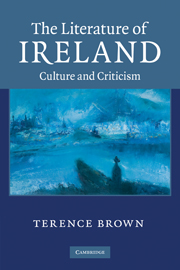Book contents
- Frontmatter
- Contents
- Acknowledgements
- Introduction
- 1 The Literary Revival: historical perspectives
- 2 Joyce's magic lantern
- 3 Music: the cultural issue
- 4 Modernism and revolution: rereading Yeats's ‘Easter 1916’
- 5 Shakespeare and the Irish self
- 6 Irish literature and the Great War
- 7 Ireland, Modernism and the 1930s
- 8 Post-modernists: Samuel Beckett and Flann O'Brien
- 9 Patrick Kavanagh: religious poet
- 10 MacNeice's Irelands: MacNeice's islands
- 11 Louis MacNeice and the Second World War
- 12 MacNeice and the puritan tradition
- 13 John Hewitt and memory: a reflection
- 14 Michael Longley and the Irish poetic tradition
- 15 Seamus Heaney: the witnessing eye and the speaking tongue
- 16 Derek Mahon: the poet and painting
- 17 Telling tales: Kennelly's Cromwell and Muldoon's ‘The More a Man Has the More a Man Wants’
- 18 Redeeming the time: John McGahern and John Banville
- 19 ‘Have we a context?’: transition, self and society in the theatre of Brian Friel
- 20 Hubert Butler and nationalism
- 21 The Irish Dylan Thomas: versions and influences
- Index
- References
18 - Redeeming the time: John McGahern and John Banville
Published online by Cambridge University Press: 05 June 2012
- Frontmatter
- Contents
- Acknowledgements
- Introduction
- 1 The Literary Revival: historical perspectives
- 2 Joyce's magic lantern
- 3 Music: the cultural issue
- 4 Modernism and revolution: rereading Yeats's ‘Easter 1916’
- 5 Shakespeare and the Irish self
- 6 Irish literature and the Great War
- 7 Ireland, Modernism and the 1930s
- 8 Post-modernists: Samuel Beckett and Flann O'Brien
- 9 Patrick Kavanagh: religious poet
- 10 MacNeice's Irelands: MacNeice's islands
- 11 Louis MacNeice and the Second World War
- 12 MacNeice and the puritan tradition
- 13 John Hewitt and memory: a reflection
- 14 Michael Longley and the Irish poetic tradition
- 15 Seamus Heaney: the witnessing eye and the speaking tongue
- 16 Derek Mahon: the poet and painting
- 17 Telling tales: Kennelly's Cromwell and Muldoon's ‘The More a Man Has the More a Man Wants’
- 18 Redeeming the time: John McGahern and John Banville
- 19 ‘Have we a context?’: transition, self and society in the theatre of Brian Friel
- 20 Hubert Butler and nationalism
- 21 The Irish Dylan Thomas: versions and influences
- Index
- References
Summary
Joyce stands behind us like the ghost of the father.
(John Banville)Part of the legacy of James Joyce to subsequent Irish writers is the inexorable realism of his vision. In Dubliners, A Portrait of the Artist as a Young Man and Ulysses, there are passages of exacting social and psychological observation – Lenehan and Corley on the streets of Dublin seeking their human prey, Stephen appalled at adult passions released at a family Christmas meal, Bloom cooking kidneys at 7 Eccles Street – which supply object lessons for subsequent Irish writers as to the revelatory powers of fictional realism, its capacity to suggest the density and complexity of human consciousness in its material contexts. Joyce's realism, it is important to stress, is more than a matter of technique (his own work goes well beyond the limits of realist art); it is a matter of world-view. A materialism of a fundamental and unshakeable kind allows him to submit human subjectivity throughout his oeuvre to a searching but almost always compassionate inspection: nineteenth-century conceptions of character no longer obtrude their moral and complacently humanistic perspectives.
It was not until the 1960s that Irish writers began to lay full claim to the inheritance of Joycean realism. Until then the harsh facts of Irish censorship had deformed the development of modern Irish fiction. This meant that even those writers like Seán O'Faoláin, Frank O'Connor, Kate O'Brien and Mary Lavin, who had sought to chronicle in their work the emergence of the new social order in a fiction which drew on the realist tradition, found themselves inhibited by the prevailing puritanical ethos or cut off from their natural audience by legal interdiction.
- Type
- Chapter
- Information
- The Literature of IrelandCulture and Criticism, pp. 225 - 238Publisher: Cambridge University PressPrint publication year: 2010

